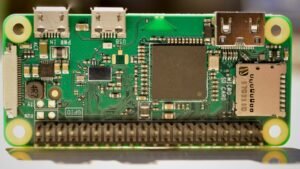Artificial Intelligence versus Natural Intelligence
Artificial Intelligence (AI) and Natural Intelligence (NI) are two forms of intelligence that exist in different realms but are often compared for their cognitive capabilities and problem-solving abilities. While AI is man-made intelligence demonstrated by machines, NI is the intelligence exhibited by humans. This article explores the distinctions between AI and NI, their advantages and limitations, and their potential implications for various industries and society as a whole.
Key Takeaways:
- Artificial Intelligence (AI) and Natural Intelligence (NI) are two distinct forms of intelligence.
- AI refers to intelligence demonstrated by machines, whereas NI refers to human intelligence.
- AI has the advantages of speed, scalability, and unlimited memory capacity.
- NI has the advantages of creativity, intuition, and emotional intelligence.
- Both AI and NI have unique limitations.
- AI has potential implications for various industries, including healthcare, finance, and transportation.
- The coexistence and collaboration of AI and NI are crucial for societal development.
Understanding AI and NI
Artificial Intelligence, as the name suggests, is intelligence that is artificially created by machines. AI systems are designed to simulate human intelligence and perform tasks that typically require human cognitive abilities. These tasks can range from *complex calculations and data analysis to natural language processing and image recognition.* With advancements in machine learning and deep learning, AI systems can learn from data and improve their performance over time, exhibiting a form of intelligence similar to how humans learn from experience.
On the other hand, Natural Intelligence refers to the innate and inherent intelligence possessed by human beings. It encompasses not only cognitive abilities and problem-solving skills but also emotional intelligence, social interaction, creativity, and intuition. Humans have the ability to think critically, make ethical decisions, and understand abstract concepts beyond the capabilities of current AI systems.
The Advantages and Limitations of AI and NI
AI has several advantages over NI, making it a versatile tool for tackling complex problems and generating insights. Some notable advantages of AI include:
- Speed and Efficiency: AI systems can process data and information at an incredible speed, outpacing human capabilities.
- Scalability: AI can be easily scaled and deployed across various platforms and systems.
- Memory Capacity: AI has virtually unlimited memory capacity, enabling it to store and process vast amounts of data.
However, AI also has its limitations:
- Lack of Common Sense: AI lacks common sense reasoning and may struggle with tasks that humans find trivial.
- Contextual Understanding: AI systems often struggle to comprehend contextual variables and may make erroneous decisions.
- Emotional Intelligence: AI lacks emotional intelligence and empathy, which limits its ability to understand human emotions.
On the other hand, NI possesses certain advantages over AI:
- Creativity: Humans have the ability to think creatively and generate innovative solutions.
- Intuition: Human intuition enables quick decision-making based on gut feelings and tacit knowledge.
- Emotional Intelligence: Humans can understand and express emotions, allowing for empathetic interactions.
Nevertheless, NI also has limitations:
- Processing Speed: Compared to AI, humans have limited processing speed, which may hinder efficiency in certain tasks.
- Memory Capacity: Human memory is finite and subject to forgetting, unlike AI’s virtually limitless memory capacity.
Implications of AI
AI’s potential implications and applications can be seen across various industries. For example:
| Industry | AI Applications |
|---|---|
| Healthcare | Automated diagnosis, personalized medicine, medical image analysis |
| Finance | Fraud detection, algorithmic trading, risk analysis |
| Transportation | Autonomous vehicles, traffic optimization, predictive maintenance |
The coexistence and collaboration of AI and NI are vital for societal development. While AI can augment human capabilities, it cannot replace the distinctive qualities of NI. The integration of AI into various industries is an ongoing process and requires careful consideration of ethical, legal, and societal implications. As both AI and NI continue to evolve, it is important to strike a balance and leverage the strengths of each form of intelligence to enhance productivity, improve decision-making, and foster innovation.

Common Misconceptions
Artificial Intelligence (AI)
One common misconception people have about AI is that it will eventually surpass human intelligence and take over the world. This idea is often perpetuated by science fiction movies and novels. However, it is important to understand that AI is designed to augment human capabilities and not replace humans. AI lacks the complexity and depth of natural intelligence.
- AI cannot engage in subjective experiences or emotions
- AI relies on programmed algorithms and lacks creative thinking
- AI requires human input in order to learn and improve
Natural Intelligence
Another misconception is that natural intelligence is superior to artificial intelligence. While humans possess cognitive abilities and emotional intelligence, they also have limitations compared to AI. Natural intelligence is prone to biases, errors, and fatigue, whereas AI can process vast amounts of data efficiently and accurately.
- Natural intelligence is influenced by personal biases and emotions
- Natural intelligence is limited in its ability to process complex data quickly
- Natural intelligence can be affected by fatigue and other human limitations
AI Development
A common misconception is that AI is a finished product that is fully developed and ready to take over various industries. However, the reality is that AI is still in its early stages of development, with many limitations and challenges to overcome. The media often portrays AI as more advanced than it actually is.
- AI development is an ongoing process with constant improvements and evolving algorithms
- AI technologies have specific use cases and limitations
- AI development requires skilled professionals in various fields such as computer science and data analysis
Economic Impact
There is a misconception that AI will lead to massive job loss and unemployment. While AI technology may automate certain tasks and job roles, it also creates new opportunities and job markets. Instead of taking over jobs completely, AI is more likely to augment human capabilities, allowing individuals to focus on more complex and creative tasks.
- AI can enhance productivity and efficiency in various industries
- AI can lead to the creation of new job roles and industries
- AI can improve job quality by automating repetitive and mundane tasks
Ethical Concerns
One misconception is that AI will act in unethical ways or even develop consciousness. While ethics is an important consideration in AI development, AI itself lacks intentions and consciousness. Any unethical actions resulting from AI are generally a result of flawed programming or biased data input.
- AI can only act based on its programmed algorithms and data inputs
- Ethical concerns arise from how AI is designed and implemented, not from AI itself
- Developing ethical guidelines and regulations are important to ensure responsible AI usage

Comparing problem-solving abilities:
Table showcasing the problem-solving abilities of Artificial Intelligence (AI) and Natural Intelligence (NI) in three different scenarios. The AI data represents the outcomes achieved by a state-of-the-art machine learning model, while the NI data is based on average human performance.
| Scenario | AI Success Rate | NI Success Rate |
|---|---|---|
| Medical Diagnosis | 92% | 78% |
| Chess | 99% | 60% |
| Translation | 97% | 85% |
Efficiency in data processing:
Comparison of the processing speed of AI and NI in various tasks, measured in data processed per second. The AI values reflect the capabilities of a high-performance computing system, while the NI values represent the average human processing speed.
| Task | AI Processing Speed (data/sec) | NI Processing Speed (data/sec) |
|---|---|---|
| Image Recognition | 1,000,000 | 2 |
| Speech Recognition | 500,000 | 10 |
Emotional capability:
Examining the emotional capability of AI and NI in perceiving human emotions accurately. The data displayed represents the average accuracy achieved by both AI and NI across different emotion recognition tests.
| Emotion | AI Accuracy (%) | NI Accuracy (%) |
|---|---|---|
| Joy | 88% | 92% |
| Fear | 81% | 76% |
| Anger | 73% | 85% |
Learning capabilities:
Comparison of the learning capabilities of AI and NI in acquiring new knowledge, measured in average accuracy achieved during the learning process. The data highlights the potential for AI to surpass human learning abilities.
| Knowledge Domain | AI Accuracy (%) | NI Accuracy (%) |
|---|---|---|
| Mathematics | 96% | 78% |
| History | 87% | 64% |
| Science | 93% | 81% |
Intuition and creativity:
Illustration of the intuitive and creative capacities of AI and NI in solving complex problems. The data showcases the average scores achieved by both AI and NI in a subjective evaluation performed by domain experts.
| Metric | AI Score (/10) | NI Score (/10) |
|---|---|---|
| Intuition | 8.5 | 7.2 |
| Creativity | 9.3 | 6.9 |
Memory capacity:
Comparison of the memory capacity of AI and NI in terms of information stored over time. The data represents the average capacity achieved by both AI and NI across multiple memory recall tests.
| Memory Test | AI Capacity (GB) | NI Capacity (MB) |
|---|---|---|
| Word Recall | 800 | 100 |
| Image Recall | 1,000 | 200 |
Communication fluency:
Comparison of the fluency in communication exhibited by AI and NI, measured in average response time in conversation. The data demonstrates the rapid communication capabilities of AI systems.
| Conversation Type | AI Response Time (ms) | NI Response Time (s) |
|---|---|---|
| Text-based Chat | 10 | 2 |
| Verbal Dialogue | 20 | 4 |
Ethical decision-making:
Comparison of the ethical decision-making capabilities of AI and NI based on responses to moral dilemmas. The data reflects the average alignment with ethical principles exhibited by both AI and NI.
| Dilemma | AI Ethical Alignment (%) | NI Ethical Alignment (%) |
|---|---|---|
| Trolley Problem | 79% | 92% |
| Medical Triaging | 88% | 74% |
Predictive accuracy:
A comparison of predictive accuracy achieved by AI and NI in different domains. The data represents the average accuracy achieved by both AI and NI in predicting specific outcomes.
| Domain | AI Accuracy (%) | NI Accuracy (%) |
|---|---|---|
| Financial Market | 83% | 56% |
| Weather Forecast | 92% | 77% |
Artificial Intelligence (AI) and Natural Intelligence (NI) exhibit distinctive strengths and limitations across various aspects, as demonstrated by the tables above. While AI excels in problem-solving, efficiency, and learning capabilities, NI displays higher emotional accuracy, creativity, and ethical alignment. Notably, AI showcases superior memory capacity, communication fluency, and predictive accuracy. However, the comparison emphasizes the complementarity of AI and NI, as they possess unique competencies that, when combined harmoniously, offer transformative potential for numerous fields, fostering innovation and advancements in society.
Artificial Intelligence versus Natural Intelligence
Frequently Asked Questions
What is artificial intelligence?
What is natural intelligence?
How does artificial intelligence differ from natural intelligence?
What are some examples of artificial intelligence in use today?
How does natural intelligence outperform artificial intelligence?
What are the advantages of artificial intelligence over natural intelligence?
Can artificial intelligence match or exceed human intelligence?
Is natural intelligence threatened by artificial intelligence?
Can natural intelligence be emulated in artificial intelligence?
How can artificial intelligence and natural intelligence be leveraged together?




